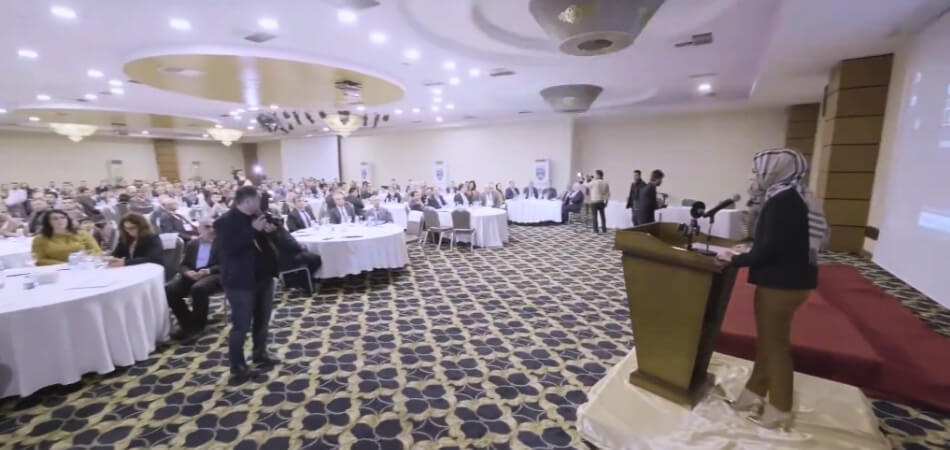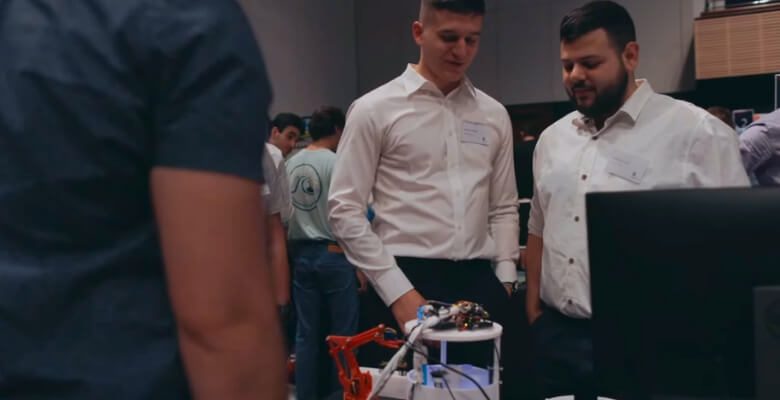Electrical engineering conferences are fantastic opportunities for networking, discovering new technologies, and sharing research. They bring together industry experts, researchers, and students, making them a hub of innovation and collaboration. But with so many options, you must be wondering how I find a upcoming electrical engineering conference?
Start by checking online databases and professional organization websites—they often list the latest events. University sites are also great resources, as many host their own conferences. Don’t forget to reach out to colleagues and join forums for recommendations. Following industry hashtags on social media and signing up for email alerts from conference organizers can also keep you in the loop.
If you wish to learn the process in detail. You can follow us throughout the article to learn everything you need to know to attend the upcoming electrical engineering conference.
What Can You Expect From an Electrical Engineering Conference?
Attending an electrical engineering conference opens up a world of insights, discoveries, and professional connections. These events are more than presentations—they’re a unique chance to engage with cutting-edge technology and like-minded peers. Let’s explore what you can expect at one of these enriching gatherings.

In-Depth Technical Sessions
Technical sessions dive into the latest developments in electrical engineering, from power systems to circuit design. You’ll hear from leading experts sharing research, practical applications, and case studies. Each session provides actionable insights that you can bring back to your work. Expect to leave with a fresh perspective on innovative problem-solving methods.
Hands-On Workshops and Demonstrations
Workshops offer a hands-on experience with new tools, software, and technologies relevant to electrical engineering. These sessions let you practice with equipment you may not access daily. They’re a rare chance to experiment under expert guidance, building practical skills. You’ll walk away with the knowledge you can apply directly to your projects.
Networking Opportunities with Industry Leaders
One major draw of these conferences is the networking potential, from casual chats to structured meetups. Engaging with professionals and leaders allows for meaningful conversations on industry trends. These interactions may lead to collaborations or even job opportunities. You’ll likely leave with new contacts and potential mentors.
Panel Discussions on Industry Challenges
Panel discussions provide a platform for experts to debate pressing issues in the field, like renewable energy or AI in engineering. Diverse perspectives from academia, industry, and startups are shared, fostering a balanced view. These sessions offer deep insight into the complexities facing the field today. You’ll gain a broader understanding of current challenges and solutions.
Exhibitions Featuring the Latest Technologies
The exhibition floor is packed with companies showcasing the latest products and innovations in electrical engineering. Here, you can explore cutting-edge technologies that might shape the industry’s future. Company representatives are on hand to discuss applications, benefits, and future plans. This is a great way to stay updated on what’s trending in tech.
Student and Young Professional Events
Many conferences feature special events geared towards students and early-career engineers. These gatherings include career workshops, mentorship sessions, and networking activities tailored to their needs. It’s a supportive space for learning, career planning, and personal growth. If you’re new to the field, this is a valuable resource for guidance.
Keynote Speeches from Visionary Leaders
Keynotes are inspiring sessions where visionary leaders share their thoughts on the future of electrical engineering. These speeches often touch on broad themes like sustainability, technological progress, and industry ethics. The speakers aim to spark curiosity and drive among attendees. You’ll leave motivated to think bigger and embrace innovation.
How I Find a Upcoming Electrical Engineering Conference?
An electrical engineering conference can provide you with the latest technological advancements, industry trends, and networking opportunities. A few simple steps can simplify the search and help you discover conferences tailored to your interests and goals. Here’s a step-by-step guide to navigating the best resources and methods available for identifying upcoming events in the field. Let’s dive into the specifics!
Step 1: Explore Online Conference Databases
Online conference databases provide extensive listings of events across various disciplines, including electrical engineering. These platforms allow you to filter events by date, location, and field, making the search easier. Regularly checking these databases ensures you won’t miss important events aligned with your area. This method is a reliable starting point for gathering a comprehensive list.
Step 2: Visit Professional Organization Websites
Websites of professional organizations, like IEEE, often maintain dedicated sections for industry-related conferences and events. They’re well-regarded sources of reliable, relevant event information due to their strong industry affiliations. Many organizations also offer membership perks, including early access to registration. This is an excellent resource for finding trusted conferences in electrical engineering.
Step 3: Browse University Websites for Conference Announcements
Universities, especially those with strong engineering departments, frequently host or sponsor electrical engineering conferences. Many of these events showcase groundbreaking research and offer a platform for academic collaboration. Visiting the websites of major engineering schools can reveal upcoming electrical engineering conferences aligned with your interests. This approach is especially useful for finding niche or specialized conferences.
Step 4: Network with Colleagues and Mentors
Personal recommendations from colleagues, mentors, or other professionals can lead you to conferences you might otherwise overlook. Networking often uncovers insider knowledge about the most valuable events to attend in the industry. Colleagues might also share their own experiences, helping you decide which events to prioritize. Building these connections is a smart move for discovering high-quality events.
Step 5: Utilize Social Media and Online Forums
Social media platforms like Twitter and LinkedIn are treasure troves for conference updates, especially if you follow relevant hashtags. Engaging in forums like ResearchGate can also keep you informed about discussions about upcoming events. These platforms provide real-time updates on conference announcements and deadlines. Social media is a dynamic way to stay in the loop and expand your professional network.
Step 6: Sign Up for Email Alerts from the Organizers
Email alerts from conference organizers or professional societies ensure you receive timely updates on upcoming events. By signing up, you get event announcements delivered straight to your inbox without actively searching. Many organizers share exclusive information on registration, deadlines, and early-bird rates via email. This convenience makes it easier to stay organized and informed.
Step 7: Check Conference Listing Websites
Websites like Global Conference Alliance offer targeted listings, simplifying your search for specific conferences in electrical engineering. You can filter searches to match your field, interests, and location, making it easy to find tailored options. These platforms often cover international events, opening up broader possibilities for conference attendance. It’s an efficient way to explore all options in one place.
Leveraging Social Media and Hashtags to Stay Informed- How to Do It?
Social media platforms are valuable tools for staying informed about the latest electrical engineering conferences and industry events. By following specific hashtags and engaging with relevant accounts, you can discover conference announcements, deadlines, and other essential updates. Here are a few simple tips to help you effectively use social media to stay in the loop.
- Search for industry-specific hashtags like #ElectricalEngineeringConference or #EEEvents to find posts about upcoming conferences and events quickly. These hashtags connect you with real-time updates and announcements.
- Follow professional organizations and popular engineering accounts that regularly post about upcoming events in electrical engineering. Staying connected to these profiles keeps you informed and engaged.
- Use the “save” feature on platforms like LinkedIn and Twitter to bookmark posts about conferences you’re interested in. This way, you can easily revisit event details when needed.
- Join LinkedIn groups or Facebook communities dedicated to electrical engineering topics to connect with other professionals and discover events. Members often share updates and recommendations that can lead to exciting opportunities.
- Comment on conference-related posts or share your own content using event hashtags to increase your visibility. Engaging with these posts can attract like-minded professionals and even organizers.
- Set up alerts or notifications for specific hashtags and accounts so that you don’t miss any updates. Notifications help you stay on top of announcements and deadlines effortlessly.
Dos and Don’ts While Looking for an Electrical Engineering Conference
Research and smart decision-making are crucial to finding the right electrical engineering conference. Certain steps can help you identify valuable events, while other actions might lead to wasted time or resources. Here’s a list of essential dos and don’ts to guide you in your search for the ideal conference.
Dos
- Research the conference’s reputation by checking reviews and feedback from past attendees to ensure a quality experience. A trusted conference often yields better networking and learning opportunities.
- Compare event locations and travel logistics to find a convenient and budget-friendly option. Proximity to your home can reduce travel costs and time.
- Consider the cost of registering for electrical engineering conferences, factoring it into your budget for professional development. Prioritize conferences offering high value within your financial plans.
- Look for conferences with workshops and technical sessions relevant to your current projects or professional interests. These targeted sessions can enhance your skills meaningfully.
- Reach out to colleagues or mentors for recommendations on conferences they found valuable or insightful. Trusted recommendations can often lead to the best events for learning.
Don’ts
- Don’t rely solely on a conference’s website claims without verifying its legitimacy through third-party sources. Some conferences may overstate their industry impact.
- Avoid selecting conferences based purely on location appeal or vacation potential, as this may not add professional value. Focus on events that align with your career goals instead.
- Don’t ignore early-bird registration dates if you want to secure a spot at a reasonable rate. Many conferences offer significant discounts for early registrations.
- Skip conferences that don’t offer specific sessions or workshops related to your field of interest. General conferences may not provide specialized insights for your growth.
- Don’t overlook smaller or lesser-known conferences, as they often provide niche knowledge and networking in a more focused environment. They can also allow for closer interaction with experts.
How Electrical Engineering Conferences Can Be Beneficial for Your Career?
Attending electrical engineering conferences can significantly enhance your career by opening doors to industry knowledge, networking, and skill development. These events are not just about presentations—they offer numerous opportunities for growth and insights into evolving trends. Here’s a look at how various aspects of conferences can benefit your career.
Expanding Technical Knowledge
Conferences offer a front-row seat to the latest advancements and research in electrical engineering. You’ll gain insights into cutting-edge technologies and innovations shaping the industry. Exposure to technical sessions can sharpen your understanding of complex concepts. This knowledge can be directly applied to projects, elevating your technical skills.
Networking with Industry Leaders
Networking is a powerful tool, and conferences provide ample opportunities to connect with professionals across levels. You’ll meet industry leaders, professors, and fellow engineers with shared interests. These connections can lead to mentorships, collaborations, or job prospects. Expanding your network often opens doors to new career paths.
Discovering Career Specializations
Electrical engineering conferences often showcase specialized fields within the industry, from power systems to telecommunications. Exposure to various topics can help you identify specific areas of interest. Gaining insight into specialized fields can guide future career decisions. Exploring these paths can ultimately shape your career focus.
Developing Presentation Skills
Participating in or presenting at a conference enhances your public speaking and presentation skills. Presenting technical material to a knowledgeable audience builds confidence and communication abilities. Learning to present complex topics clearly is valuable in many career settings. These skills are transferable to team meetings, client presentations, and beyond.
Learning About Emerging Trends
Conferences highlight the latest trends in technology, materials, and processes impacting electrical engineering. Being aware of these trends allows you to stay current in a rapidly evolving field. This knowledge can make you a valuable asset to employers focused on innovation. Staying updated also helps you anticipate industry changes and adapt.
Accessing Exclusive Job Opportunities
Some conferences include career fairs or recruitment sessions hosted by leading engineering firms. These sessions offer direct access to companies actively seeking skilled professionals. You can interact with recruiters and learn about their hiring priorities. Conference job fairs can be a direct route to exciting new positions.
How Should You Prepare Yourself for the Upcoming Conference for Best Utilizations?
Preparing for an electrical engineering conference can help you maximize the value of your experience and achieve professional goals. With a few key steps, you can ensure you’re ready to network, learn, and make lasting connections. Here are some essential tips to help you make the most of your time and resources.
- Review the conference agenda thoroughly to identify sessions most relevant to your professional growth and development goals. This helps you prioritize and organize your schedule efficiently.
- Set clear objectives that align with the core purpose of electrical engineering conference attendance: enhancing knowledge and building valuable connections. Defined goals will keep your focus sharp and guide you throughout the event.
- Bring business cards and digital contact options to share easily with new connections and potential collaborators. Being prepared makes networking seamless and more effective.
- Research the speakers and presenters beforehand to prepare insightful questions or discussion topics relevant to your interests. This makes for more engaging and productive interactions.
- Engage on social media using the conference hashtag to connect with fellow attendees before the event. This builds familiarity and can lead to meaningful in-person interactions.
- Pack essential materials, like a notebook, charger, and comfortable attire, to ensure you’re equipped for a full day. Planning for comfort lets you focus fully on the sessions.
FAQS About How I Find a Upcoming Electrical Engineering Conference?
Finding the right electrical engineering conference can open doors to learning, networking, and career advancement. To help streamline your search, here are some frequently asked questions with answers that provide valuable tips and insights.
Where Can I Find Reliable Listings of Electrical Engineering Conferences?
You can find reliable conference listings on academic databases, professional organization websites, and platforms like IEEE or ResearchGate. These sources often categorize events by field and date, making it easy to browse upcoming electrical engineering conferences in one place.
How Far in Advance Should I Start Searching for Conferences?
It’s best to start searching for conferences three to six months in advance to ensure a spot and plan travel. Early searches also give access to discounted registration rates and allow time to review the agenda thoroughly.
Are There Online Resources Dedicated to International Engineering Conferences?
Yes, several websites like Global Conference Alliance and AllConferences provide global engineering conference listings. These platforms allow you to filter by location, topic, or date, helping you find events outside your local area that fit your interests.
What Keywords Should I Use When Searching for Conferences?
Using specific keywords like “electrical engineering conference 2024,” “EE events,” or “technical workshops” improves search relevance. Adding terms related to your focus area, such as “power systems” or “telecommunications,” can help locate specialized events that match your interests.
Can Professional Networking Groups Help Me Discover Conferences?
Yes, professional networking groups on LinkedIn or in-person engineering associations often share announcements about upcoming conferences. These groups may even offer recommendations based on members’ past experiences, guiding you toward events worth considering for your career growth.
Bottom Lines
Conferences offer invaluable opportunities to expand your knowledge, network with industry leaders, and explore new career paths. These events, rich with technical sessions, workshops, and discussions, serve as hubs of innovation and professional growth.
If you’re asking, “how I find a upcoming electrical engineering conference?” a strategic approach—using online databases, social media, and recommendations from colleagues—can simplify the search.
With the right preparation, each conference becomes an avenue to advance your skills, gain insights, and make meaningful connections. Embrace these resources to maximize your experience and drive your engineering career forward.







